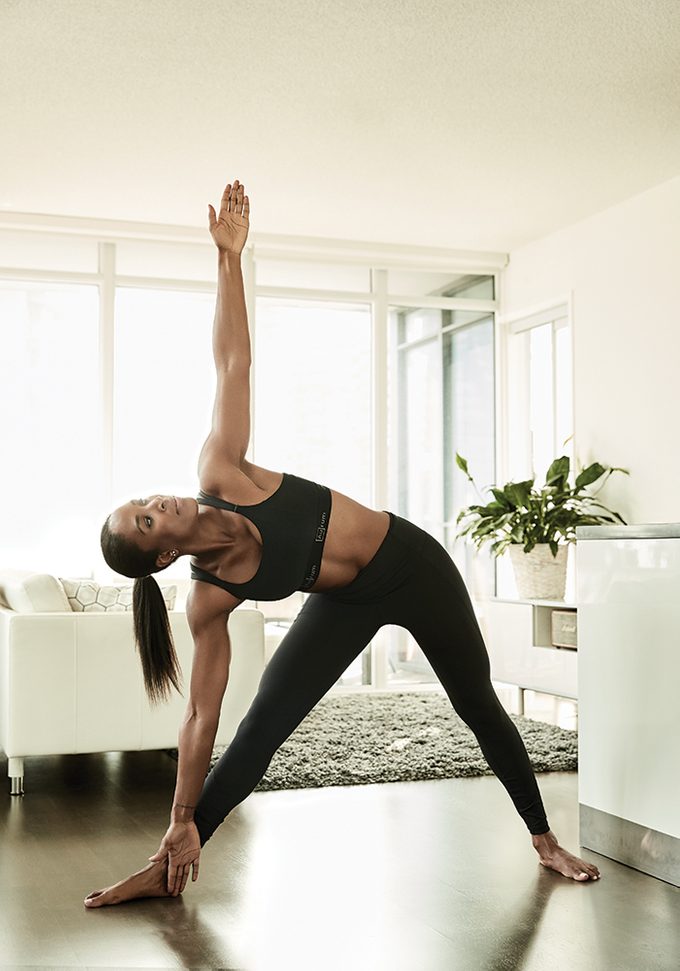How Fitness Blogger Sasha Exeter Recovered from Fibromyalgia and Kidney Disease
Roadblocks forced Sasha Exeter to forge a new path. She’s never looked back.

When a health crisis sidelined Sasha Exeter in her late 20s, the former athlete essentially lost her identity. In the following years, while of dealing with her deteriorating health, Sasha also ended her engagement and left her corporate career. To cope, she founded SoSasha.com, a lifestyle blog that has since catapulted her onto the wellness scene, where she works with brands like Joe Fresh and Genuine Health. “I find that sometimes the best discoveries and opportunities arise when you’re at your lowest low,” she tells us on the set of our May cover shoot. What started as a creative outlet during a very tough period in her life has become a dream career. “I decided I was going to stop waiting for people to give me an opportunity and create my own,” she says.
Clearly, Sasha is a woman in control of her own destiny, and she believes you can be, too. “I feel that a lot of people live their life in fear and don’t really understand how much power they have to make changes,” she says. “When you look beyond fear, that’s when you reap the most rewards.”
Though she now appears as the epitome of strength – and has the half-marathon medal and muscles to prove it – Sasha isn’t afraid to show her vulnerability. Here, she shares how she overcame her challenges.
You’ve shared your health struggles with fibromyalgia and kidney disease. When did you realize you needed to make a change in your lifestyle?
I had literally hit rock bottom. I listened to my treating physicians and did everything they said and I really wasn’t seeing any improvement in my health. As a very fit and active individual, being on bedrest for over a year and not really being able to be mobile was terrifying. One day, I just woke up thinking enough is enough; I have to take this into my own hands. I dumped every doctor I had and built a new team. I started doing reiki and acupuncture, saw a nutritionist, changed my diet and slowly started to wean myself off all the medications. I also get weekly treatments from a naturopath, migraine and pain specialist and chiropractor. It wasn’t until then that I started to see a difference.
What motivated you to get healthy?
I wanted my life back – I hadn’t reached my potential. I’m a high-performing individual and I’m very competitive. I felt like I was throwing in the towel too early, and I wasn’t OK with that.
How did illness affect your body image and self-esteem?
Playing tennis my whole life and being active, I never had an issue with body image. I was always in great shape, and my body was what I was most confident about. I gained about 35 pounds from inactivity, a poor diet and depression. Eventually, I was diagnosed with fibromyalgia.
I distinctly remember feeling so insecure when I started to become active again. I was too embarrassed to go to the gym, so I started to run. It was accessible and I didn’t need to be around anybody, so I used to run at 5:30 or 6 in the morning. I’m not lying – I couldn’t even get around my parent’s block. I just can’t describe how much of a contrast that is to playing tennis at an international level. I pushed myself and I would do one extra lap around the block every week. By the end of that summer, I was running 8 to 10K. Not only was it helping me physically but the benefits were also mental. It was very meditative for me.
Do you still have bad days, and how do you tackle them?
I’m challenged every day. I’m still in pain. I guess it’s my new normal. Some days it’s very hard to get out of bed, but other days I feel pretty good. It’s more manageable when I’m active. Now, I enjoy hiking, yoga, running, cycling and cross training.
What are your tips for others in similar situations?
“Never give up. It’s never going to be easy, but you have to find that one thing that you enjoy. When it comes to fitness, if you don’t like what you’re doing, you’re not going to continue to do it. Of course, with some illnesses, you need to call in the big guns – meaning medication –when absolutely necessary, but knowing how to manage your condition through diet and exercise is important.”
When you left your corporate career, you mentioned that you had grown tired of searching for happiness in a paycheque. How do you define happiness today?
“I actually know what it is now. Today, happiness is shutting down at 7:30 p.m. and having a proper dinner with my partner (at the table) and talking about our day, without the television. It’s taking a walk along the water with our dog. Having a good work-life balance. Being healthy. All the little things I used to take for granted.”
You have “perseverance” tattooed on your right wrist. What does that word mean to you?
“People put lipstick on their mirror or leave Post-it Notes for themselves. I needed something I could look at every day as a reminder of how far I’ve come and how far I still need to go.”
Sasha’s Thoughts on Exercise
1. Morning or night?
“Morning.”
2. Indoors or outside?
“Outdoors.”
3. Yoga or Pilates?
“Yoga.”
4. Solo or group?
“Ohh, solo. It depends on what I’m doing, the time of year, my mood.”
5. Squats or sit-ups?
“Sit-ups.”
For more inspiration from Sasha, read her 5 Hustle-Harder Mantras.




